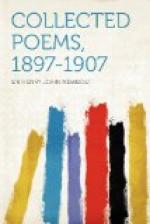But there within John Nicholson
Turned him on Mehtab Singh,
“So long as the soul is in my body
You shall not do this thing.
“Have ye served us for a hundred years
And yet ye know not why?
We brook no doubt of our mastery,
We rule until we die.
“Were I the one last Englishman
Drawing the breath of life,
And you the master-rebel of all
That stir this land to strife—–
“Were I,” he said, “but a Corporal,
And you a Rajput King,
So long as the soul was in my body
You should not do this thing.
“Take off, take off, those shoes of pride,
Carry them whence they came;
Your Captains saw your insolence,
And they shall see your shame.”
When Mehtab Singh came to the door
His shoes they burned his hand,
For there in long and silent lines
He saw the Captains stand.
When Mehtab Singh rode from the gate
His chin was on his breast:
The Captains said, “When the strong command
Obedience is best.”
The Guides at Cabul
(1879)
Sons of the Island race, wherever ye dwell,
Who speak of your fathers’ battles
with lips that burn,
The deed of an alien legion hear me tell,
And think not shame from the hearts ye
tamed to learn,
When succour shall fail and the tide for
a season turn,
To fight with joyful courage, a passionate pride,
To die at last as the Guides of Cabul died.
For a handful of seventy men in a barrack of mud,
Foodless, waterless, dwindling one by
one,
Answered a thousand yelling for English blood
With stormy volleys that swept them gunner
from gun,
And charge on charge in the glare of the
Afghan sun,
Till the walls were shattered wherein they couched
at bay,
And dead or dying half of the seventy lay.
Twice they had taken the cannon that wrecked their
hold,
Twice toiled in vain to drag it back,
Thrice they toiled, and alone, wary and bold,
Whirling a hurricane sword to scatter
the rack,
Hamilton, last of the English, covered
their track.
“Never give in!” he cried, and he heard
them shout,
And grappled with death as a man that knows not doubt.
And the Guides looked down from their smouldering
barrack again,
And behold, a banner of truce, and a voice
that spoke:
“Come, for we know that the English all are
slain,
We keep no feud with men of a kindred
folk;
Rejoice with us to be free of the conqueror’s
yolk.”
Silence fell for a moment, then was heard
A sound of laughter and scorn, and an answering word.
“Is it we or the lords we serve who have earned
this wrong,
That ye call us to flinch from the battle
they bade us fight?
We that live—do ye doubt that our hands
are strong?
They that are fallen—ye know
that their blood was bright!
Think ye the Guides will barter
for lust of the light
The pride of an ancient people in warfare bred,
Honour of comrades living, and faith to the dead?”




